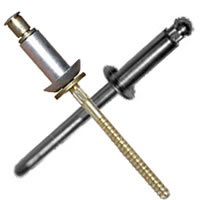
Rivets are available in a variety of materials, one of the most common being aluminum. From the 2117-T “field” rivet to the 1100 rivet, 5056 rivet and more, most rivets used in aerospace manufacturing are made entirely or mostly of aluminum. You can still find rivets made of other materials, but aluminum rivets offer several benefits that make them a popular choice.
Corrosion Resistant
Aluminum rivets are highly resistant to corrosion. Unlike steel rivets, they don’t rust; rust only occurs with iron alloys. It involves a chemical reaction, oxidation, between iron and oxygen. There’s no iron in aluminum, so pure aluminum can’t rust.
Aluminum rivets boast a high level of resistance to corrosion, meaning they can withstand environmental exposure to water and oxygen without rusting or corroding.
Strong
Some people assume that aluminum rivets are weak, but this couldn’t be further from the truth. While their physical properties may vary, most aluminum rivets are very strong.
Like all rivets, aluminum rivets are used in fastening applications. They are permanent fasteners that hold two or more parts together. Aluminum is a versatile metal that’s both lightweight and strong. Aluminum rivets retain these properties. You can use them to secure multiple parts together without fear of the aluminum rivets failing.
Compatible With Aluminum Parts
Another benefit of aluminum rivets is compatibility with aluminum parts. When securing multiple parts with rivets, you should typically stick with the same material. If the parts are made of aluminum, for instance, you should use aluminum rivets.
Aluminum parts, of course, are common in the aerospace manufacturing industry. Statistics show that 20% of all aircraft designs consist of aluminum. Aluminum rivets are compatible with these aluminum aircraft parts.
Multiple Styles
You can find aluminum rivets in multiple styles, such as solid and blind. Solid rivets live up to their namesake by being partially solid. When struck with a hammer or tool, the head will collapse, thereby securing the parts together.
Blind rivets feature a different, more complicated design. They still have a head and shank, but they only require access to a single side of the parts to install. Solid rivets, in comparison, typically require access to both sides of the parts (the front and back) to install. Regardless, aluminum rivets are available in multiple styles, including solid and blind styles.
Nonmagnanetic
You don’t have to worry about aluminum rivets causing magnetic interference with electronic equipment. Aluminum is a nonmagnetic material. Therefore, it doesn’t cause magnetic interference.



